
-
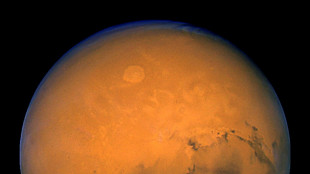 Moon or Mars? NASA's future at a crossroads under Trump
Moon or Mars? NASA's future at a crossroads under Trump
-
Spotify adds more AI-generated audiobooks

-
 Stocks in the red as investors worry about growth and inflation
Stocks in the red as investors worry about growth and inflation
-
Bond franchise shifts to Amazon as Broccoli family steps back

-
 Unfair? Figures belie Trump's claims on EU trade balance
Unfair? Figures belie Trump's claims on EU trade balance
-
Stock markets mostly lower on Fed concerns over Trump policies

-
 France moves to ban marriage for undocumented migrants
France moves to ban marriage for undocumented migrants
-
Walmart sales rise but shares tumble on forecast

-
 Spain court convicts ex-football chief for sexual assualt over forced kiss
Spain court convicts ex-football chief for sexual assualt over forced kiss
-
Mercedes-Benz flags cost cuts, tough year ahead after torrid 2024

-
 ECB rate hikes result in record loss in 2024
ECB rate hikes result in record loss in 2024
-
Romanian director Jude shoots latest film in 10 days on an iPhone

-
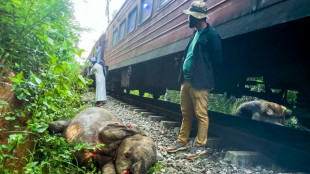 Sri Lanka passenger train kills six elephants
Sri Lanka passenger train kills six elephants
-
Stock markets mixed on Fed concern over Trump policies

-
 Birkenstock sandals are not art, German court rules
Birkenstock sandals are not art, German court rules
-
Markets drop, gold hits record on Fed concern over Trump policies

-
 Airbus profit climbs in 2024, aims to accelerate output
Airbus profit climbs in 2024, aims to accelerate output
-
Airbus proft climbs in 2024, aims to accelerate output

-
 Trump says trade deal with China 'possible'
Trump says trade deal with China 'possible'
-
Northern Japan snowed under after two-week whiteout

-
 Mercedes-Benz profits plunge as German carmakers reel
Mercedes-Benz profits plunge as German carmakers reel
-
'We will save them': The quest to rescue nearly extinct rhino
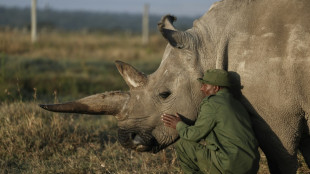
-
 Berlin film festival nurtures portraits of messy motherhood
Berlin film festival nurtures portraits of messy motherhood
-
Renault revs up profitability in 2024

-
 Japan's trade minister arranging US trip: reports
Japan's trade minister arranging US trip: reports
-
Eyeing China and US, EU hopes clean tech boost will spark growth

-
 Trump considering 'alternatives' to Boeing for Air Force One contract
Trump considering 'alternatives' to Boeing for Air Force One contract
-
Afghanistan problem 'can be solved': former women's affairs minister

-
 Lights out for Indonesia civil servants as Prabowo cuts budgets
Lights out for Indonesia civil servants as Prabowo cuts budgets
-
London Fashion Week launches with ode to gender fluid designs

-
 Asian markets drop as Fed flags concern over Trump policies
Asian markets drop as Fed flags concern over Trump policies
-
Heated immigration debate complicates Germany's search for workers

-
 Australia seeks to turn failing steel plant into 'green' hub
Australia seeks to turn failing steel plant into 'green' hub
-
Conservative Merz leads Germany's turbulent election race

-
 After rocky road, Havana's 'Cathedral of Ice Cream' back in from the cold
After rocky road, Havana's 'Cathedral of Ice Cream' back in from the cold
-
Hezbollah readies massive funeral for slain leader Nasrallah
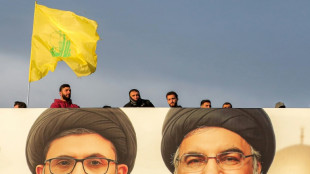
-
 Indonesia industrial coal power plans undercut emissions pledge: report
Indonesia industrial coal power plans undercut emissions pledge: report
-
Reach Secures Major Investment to Accelerate Its Global Expansion and Fuel Enterprise Merchant Growth

-
 Trump moves to end New York congestion pricing, sparking legal challenge
Trump moves to end New York congestion pricing, sparking legal challenge
-
Stock markets pressured by Trump auto tariff threat

-
 Trump's labor nominee walks back pro-union stances
Trump's labor nominee walks back pro-union stances
-
Apple adds lower-price iPhone 16e to line-up

-
 Ikea hopes for furniture market improvement in 2026
Ikea hopes for furniture market improvement in 2026
-
Game, set, hate: WTA stars reveal fears after Raducanu's Dubai shock

-
 Tajikistan to publish new dress 'guidelines' for women
Tajikistan to publish new dress 'guidelines' for women
-
Stock markets skid after Trump threatens auto tariffs

-
 Glencore looks to leave London Stock Exchange as falls into loss
Glencore looks to leave London Stock Exchange as falls into loss
-
Stock markets fall as traders assess latest tariffs volley

-
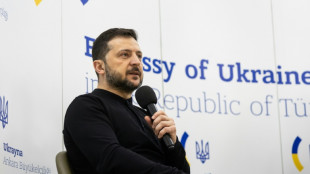 Poll gives Zelensky 57% approval rating despite Trump claims
Poll gives Zelensky 57% approval rating despite Trump claims
-
BAE profits boosted by defence spending amid Ukraine war


UN nuclear chief to view soil removed from Fukushima
The UN nuclear watchdog chief arrives in Japan on Tuesday for a trip that will include his first visit to storage facilities for soil contaminated in the 2011 Fukushima disaster.
It is the fifth official visit to the country by Rafael Grossi, head of the International Atomic Energy Agency (IAEA).
The organisation is monitoring the decades-long process to decommission the Fukushima Daiichi nuclear plant, which went into meltdown after being hit by a tsunami in the worst nuclear disaster since Chernobyl.
Workers at the wrecked plant on Japan's northeast coast last week began dismantling wastewater storage tanks to free up space for tonnes of nuclear debris.
Grossi will tour the site on Wednesday, and will also be shown the contaminated soil that the government is currently discussing how to handle.
After the disaster, about 13 million cubic meters of soil and about 300,000 cubic meters of ash from the incineration of organic material was removed from the wider Fukushima region, as part of decontamination efforts.
For comparison, the Tokyo Dome arena, where US pop superstar Taylor Swift performed last year, has a capacity of 1.24 million cubic metres.
The soil is being kept at interim storage facilities, over a total area of 16 square kilometres (six square miles).
Japan plans to recycle roughly 75 percent of the removed soil -- the portion found to have low radioactivity levels.
If this material is confirmed safe, authorities want to use it for civil engineering projects, including building embankments for roads and railways, the government and the IAEA say.
The remaining soil will be disposed of outside Fukushima region ahead of a 2045 deadline.
The government has said it intends to confirm the disposal site this year, with Fukushima's regional governor reportedly urging them to come up with a plan quickly.
"Japan's approach for recycling and disposing of soil and radioactive waste from decontamination activities... is consistent with IAEA safety standards," the IAEA said in September in its final report on the soil issue.
The Fukushima plant was hit by a huge earthquake-triggered tsunami in March 2011 that killed 18,000 people.
The most dangerous part of the complex Fukushima plant clean-up -- removing around 880 tonnes of radioactive fuel and rubble from three stricken reactors -- has only just begun, with one tiny sample removed by a robotic claw.
During Grossi's visit, experts from the IAEA and neighbouring countries including China and South Korea will also take seawater and fish samples "to further increase the transparency" of the process of releasing treated wastewater into the sea, an official from Japan's energy agency said.
Plant operator TEPCO in August 2023 began discharging 1.3 million tonnes of collected groundwater, seawater and rainwater, along with water used for cooling the reactors.
The water release has been endorsed by the IAEA, and TEPCO says all radioactive elements have been filtered out except for tritium, levels of which are within safe limits.
But countries including China and Russia have criticised the release and banned Japanese seafood imports over safety concerns.
China in September said it would "gradually resume" importing seafood from Japan but this has yet to begin.
X.Cheung--CPN
